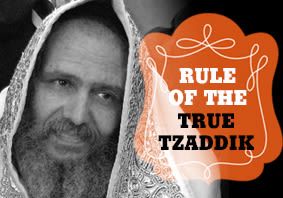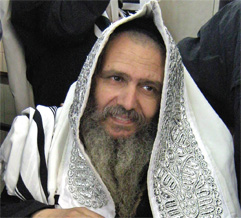
Mikeitz: Rule of the True Tzaddik
What was Joseph's secret power that enabled him to be the de facto ruler over all of Egypt? What does this teach us about today's leaders?

"And Joseph, he is the ruler over the land…"(Genesis 42:6).
The above passage raises several questions: first, why does the Torah say that Joseph ruled over the land rather than saying the he was ruler in the land? Second, wasn't Pharaoh the ruler and Joseph the viceroy? So why does the Torah say that Joseph was the ruler? Third, why does the Torah speak in present tense, that Joseph is the ruler rather than saying that he was the ruler?
First, the Torah often conveys the deepest messages in one word. Had the Torah said that Joseph is ruler in the Land of Egypt, the Torah would be telling us that Joseph fulfilled the task of ruler in the Land of Egypt, the same way as if he were a physician in the local hospital or pharmacist in the neighborhood drugstore. But, by telling us that Joseph is the ruler over the land, the Torah is telling us that whatever Joseph decides is law. As the true tzaddik of the generation, he decrees and Hashem does his will. The Midrash tells us the grain of those who tried to weather the famine on their own rotted even if it was stored in the most ideal of conditions. Everyone was forced to seek Joseph and his government grain-storages if they wanted to avoid starvation. Joseph controlled every element of the land – mineral, plant, animal and human. As a tzaddik of impeccable personal holiness, he had total control over himself and his bodily desires. He was therefore able to rule over the entire land, and not merely serve the function of ruler in the land.
Second, despite the fact that Pharaoh was king and Joseph was viceroy, Joseph was the de facto ruler and not Pharaoh. Why? Pharaoh was busy with bodily indulgences as his ancestors before him. We all remember how the servants of Grandfather Pharaoh were so eager to abduct our matriarch Sarah, for they knew how much their master would delight in such a beautiful woman. Our sages tell us the the current Pharaoh followed in his grandfather's footsteps. Since Egypt was a land that was fraught with promiscuity, its leader most surely was a leading indulger in the pursuit of lewdness and lust. Unlike  Joseph, he was ruler in the land but not over the land. One who cannot control his bodily urges certainly cannot control an entire nation. On the other hand, Joseph was capable of ruling over himself as well as ruling over all of nature, since the true tzaddik has the power – according to the Zohar – to rule over all of nature. Many are the stories throughout the written and oral Torah where the true tzaddikim were capable of overriding nature and natural law. Joshua made the sun stand still. Elijah the Prophet revived the dead. Rebbe Eliezer made a tree hop backwards. The Chofetz Chaim commanded an evil spirit to leave a person's body.
Joseph, he was ruler in the land but not over the land. One who cannot control his bodily urges certainly cannot control an entire nation. On the other hand, Joseph was capable of ruling over himself as well as ruling over all of nature, since the true tzaddik has the power – according to the Zohar – to rule over all of nature. Many are the stories throughout the written and oral Torah where the true tzaddikim were capable of overriding nature and natural law. Joshua made the sun stand still. Elijah the Prophet revived the dead. Rebbe Eliezer made a tree hop backwards. The Chofetz Chaim commanded an evil spirit to leave a person's body.
What makes a person a true tzaddik? The Zohar answers in three Aramaic words – man denatar brit, one who carefully guards personal holiness. Impeccable personal holiness is the common denominator of all the true tzaddikim throughout the ages and the secret to their power to rule over all of creation. Pharaoh was king in Egypt, but he was the antithesis of personal holiness. Joseph was the quintessence of personal holiness; therefore he, not Pharaoh, was the ruler "over the land", as the Torah tells us.
Third, why does the Torah speak in present tense, that Joseph is the ruler rather than saying that he was the ruler?
The Torah is not a mere book of history and stories. It's the template of creation and of timeless truth. Joseph, the symbol of the true tzaddik and of uncompromising personal holiness, represents the true tzaddikim of every generation. People look at the world's leaders, but in truth, it's the true tzaddik who rules – present tense.
We ask ourselves, why is the world in such a disastrous situation today? The answer is simple. Every day, we hear about another world leader who has entangled himself in a scandal. Any individual of minimal common sense is shocked: a statesman devotes his entire life to climbing the ladder of leadership until he reaches the office of president, prime minister, member of congress or parliament and the like. Yet, for a few moments of debaucher's indulgence, he is willing to throw his entire career away. Nothing could be more senseless. In total contrast to the true tzaddik, the Pharaoh-type leader can't control his own animal appetites and lusts; he therefore certainly cannot govern an entire nation. May it be Hashem's will that the world submit soon too the rule of the true tzaddikim and particularly Moshiach Tzidkenu, speedily and in our days, amen!







12/14/2014
The true Tzaddikim are hidden.
i also thought a common denominator of the tzaddikim (and the source of their power so to speak) is that they are hidden? case in point – see the "prince made of precious gems"
12/14/2014
i also thought a common denominator of the tzaddikim (and the source of their power so to speak) is that they are hidden? case in point – see the "prince made of precious gems"